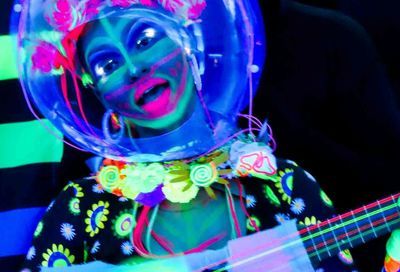TV Review: Netflix’s ‘Feel Good’ delivers a satisfying, three-dimensionally queer relationship
"Feel Good" takes its final bow with a powerful season two of the topsy-turvy love story of George and Mae

Having flown under the radar with its mid-March 2020 debut, Netflix and Channel 4’s romantic comedy series Feel Good (★★★★☆) wraps its brief but notable run with a tight set of episodes that go bold in resolving the love story of Mae and George.
Grounded in the reality and reported addiction struggles of Canadian-born, UK-based comedian Mae Martin, the series’ first season, written by Martin and co-creator Joe Hampson, depicted an authentic-feeling recovery journey.
Most of the laughs derived from Mae’s misfit standup buddies, and from the awkwardness surrounding bisexual Mae dating bisexual woman George (Call the Midwife‘s Charlotte Ritchie), who hadn’t considered herself bi before meeting Mae. For Mae’s part, they are totally out about their sexual orientation, but still on the fence about their gender identity.
However, gender is not Mae’s focus as the couple’s relationship heats up, blows up, and twists in myriad directions, including dalliances with other partners, like George’s proudly bi-poly-cis-man co-worker, Elliott (Jordan Stephens).
Stephens, star of the engaging 2018 drag dramedy Tucked, is a solid addition to the cast, joining season one regulars Phil Burgers as George’s extremely empathetic roomie Phil, and Adrian Lukis and Lisa Kudrow as Mae’s extremely skeptical parents Malcolm and Linda.

Mae’s past transgressions have stretched their family’s love and trust nearly to the breaking point, a complicated position that Kudrow portrays vividly through Linda’s mix of vulnerability and take-no-prisoners bluntness. We don’t get nearly enough of the sitcom vet, although she knocks the series finale episode out of the park.
Likewise, Ritchie and Martin’s work throughout the series is beautifully layered with humor, pain, strength, fear, and so much lust. Mae and George have lots of sex, in lots of places. None of their alternative lovers produce nearly the combustible chemistry that pops off when these two flirt, fight, or role-play.
Theirs is a three-dimensionally queer relationship, and wherever the series leaves them, simply knowing Mae and George were here could potentially create more space for other free-wheeling comedies about bisexual, bee-loving, schoolteachers like George.
Yet the show’s most lasting impression might be left by its assured handling of its most sensitive storyline, which finds Mae confronting the past sexual abuse of someone who was and is a close friend and confidant.
Mae’s path towards feeling good, or at least better, involves facing their abuser. Neither is let off the emotional hook easily, and Martin especially delivers the full arc of Mae’s story with a sense of truth and intensity that cuts straight to the heart.
Feel Good seasons 1 and 2 are available for streaming on Netflix. Visit www.netflix.com.
Read More:
Road Head review: Sharp, witty gay horror with a gruesome climax
Cruella review: A hyperbolic, hyperactive fashion fail
‘A Quiet Place: Part II’ review: Greater scale, but less intensity
Support Metro Weekly’s Journalism
These are challenging times for news organizations. And yet it’s crucial we stay active and provide vital resources and information to both our local readers and the world. So won’t you please take a moment and consider supporting Metro Weekly with a membership? For as little as $5 a month, you can help ensure Metro Weekly magazine and MetroWeekly.com remain free, viable resources as we provide the best, most diverse, culturally-resonant LGBTQ coverage in both the D.C. region and around the world. Memberships come with exclusive perks and discounts, your own personal digital delivery of each week’s magazine (and an archive), access to our Member's Lounge when it launches this fall, and exclusive members-only items like Metro Weekly Membership Mugs and Tote Bags! Check out all our membership levels here and please join us today!


















You must be logged in to post a comment.